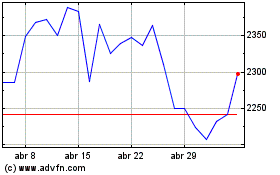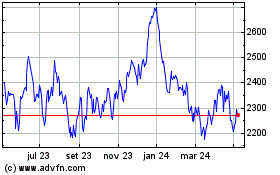BHP Reviews Nickel Plans Amid Market Rout -- Update
17 Janeiro 2024 - 9:35PM
Dow Jones News
By Rhiannon Hoyle
The world is awash in nickel, one of the key ingredients in
batteries for electric vehicles. That's roiling many miners that
produce it.
BHP Group, the world's largest miner by market value, on
Thursday joined several other producers in saying it will rethink
plans for its nickel business to help it ride out the industry
downturn. Prices of nickel have halved since the start of last
year, as demand for the metal, including from EV makers, has failed
to keep pace with new supply coming from countries including
Indonesia.
BHP signaled it may write down the value of its nickel assets,
which include open-cut and underground mines and a refinery in
Western Australia. It also said the operations, known as Nickel
West, are "being actively optimized" while it works out ways to
mitigate the sharp fall in prices.
"The nickel industry is undergoing a number of structural
changes and is at a cyclical low in realized pricing," the mining
giant said in a quarterly report. "Nickel West is not immune to
these challenges."
Nickel is primarily used in stainless steel, which accounts for
more than 60% of global demand for the metal, although its use in
electric vehicle batteries has been rising sharply. It isn't the
only commodity used in the global energy transition that is having
a tough time. Prices of lithium and cobalt have slumped, partly
because EV sales growth in the U.S. has plateaued.
BHP's view that the nickel market is experiencing structural
changes suggests it sees little prospect in a recovery any time
soon. Other companies have also been curbing production and writing
down investments in response to the downturn in prices.
Earlier this week, Canada's First Quantum Minerals said it will
suspend mining at its Ravensthorpe nickel mine in Australia, citing
weak prices and high costs. A week earlier, the administrators of
Panoramic Resources said its nickel operation, Savannah, would be
suspended as hopes of a recovery in finances faded. Miner IGO last
month braced investors for another write-down of its Cosmos nickel
project, also in Australia.
Western miners of nickel face a challenge competing with output
from Indonesia, which is typically produced at a lower cost.
Indonesia produced around half of all nickel used in EV batteries
made in 2022, up from somewhere between zero and 5% in 2017,
according to CRU, a London-based firm specializing in commodities
business intelligence. That's expected to exceed 80% by 2027, CRU
says.
The supply glut is reverberating through markets. On the London
Metal Exchange, the benchmark nickel contract has fallen to roughly
$16,000 a metric ton, from more than $30,000 a ton at the start of
last year.
BHP, which owns several undeveloped nickel deposits, including
some acquired through its takeover of OZ Minerals, said it was paid
24% less for its nickel in the six months through December versus
the year-prior period.
BHP's own production of the metal in the the six months through
December was 4% higher than the same period a year earlier. The
miner stuck with an existing production forecast for the year
through June, 2024, of between 77,000 and 87,000 tons.
Write to Rhiannon Hoyle at rhiannon.hoyle@wsj.com
(END) Dow Jones Newswires
January 17, 2024 19:20 ET (00:20 GMT)
Copyright (c) 2024 Dow Jones & Company, Inc.
Bhp (LSE:BHP)
Gráfico Histórico do Ativo
De Mar 2024 até Abr 2024

Bhp (LSE:BHP)
Gráfico Histórico do Ativo
De Abr 2023 até Abr 2024
